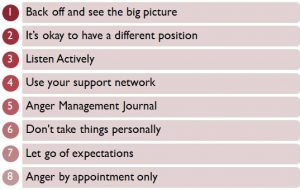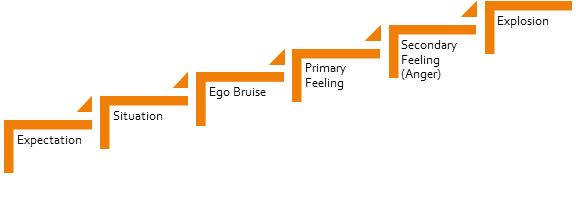We can either make ourselves miserable or we make ourselves strong.
The amount of work is the same.
Carlos Castaneda Don Juan, Journey to Ixilan
Causes of Anger: Unmet expectations
| Failure to achieve a personal goal | Invasion of a personal boundary | Self-Defence Anger (Protect the Ego) |
Shadow Projection | Repress feeling that would cause discomfort and pain |
(Adapted from Mike Fisher, Beating Anger)
Anger is one way of trying to change or control behaviours of others:
- To get attention (by whatever means, including bad behaviour)
- To show who is boss – as a power struggle
- Revenge
- Learned Helplessness
It has several payoffs
Anger Escalation
Source Life Skills International and UK course with the Counselling Pastoral Trust
“Speak when you are angry
and you will make the best speech you will ever regret”Ambroise Bierce
Anger comes from a number of triggers:
(M McKay, Anger Control Handbook)
- The perception that you’ve been hurt or victimised
- The belief that the provoking person harmed you deliberately
- The belief that the provoking person was wrong and bad to harm you, and should have behaved differently
- They ought to change so the pain should stop
- They are responsible for the harm AND are required to fix it.
We create rules with anger:
(Melodie Beattie, Co-dependent no more)
Anger Rules
- Control Based Rules
- If we feel angry, that person must go away
- If we feel angry, the other person must fix things
- If we’re angry, it’s okay to shout, or it’s okay to hit
- If we’re angry then that justifies our feelings
- Fear Based Rules
- Anger is sinful
- It’s not okay to feel anger I nice people aren’t angry
- We shouldn’t feel angry when we do
- We’ll lose control and go crazy if we get angry
- If someone is angry with use, then we must have done something wrong
- If other people are angry with us, we must have made them feel that way and we’re responsible for fixing their feelings.
- Feel ashamed by anger
5 Anger Styles
( Mike Fisher, Beating Anger)
| You | Partner | ||
| Intimidator | Controlling others by aggressive stance: and position, shouting, intimidating or patronizing statements | ||
| Interrogator | Using a machine gun spray of questions intended to make others experience their behaviour as inappropriate, bad or shameful, humiliates or closes communications | ||
| The Poor Me | Gaining attention from others by making them feel ashamed because they have neglected us in some way e.g. “You’re so selfish, you never think of me” | ||
| The Distancer | The other person will guess I am angry or upset and will follow me to acknowledge and respond to my anger. Often the distancer describes the feelings as thoughts. “I never get angry” | ||
| The Winder-upper | Using jokes, mocking and teasing. Putting someone down makes me feel better. If I can get others to feel & express my unexpressed anger: “can’t you take a joke?”, “lighten up” |
8 Golden Rules of Anger Management
(Fisher, 2009)

The visible outpouring of that behaviour can be from imploding or exploding:
Anger Lessons to Learn
- Imploders need to learn:
- To deal with their fear of abandonment and rejection
- Not to take things so personally
- They have a right to express and communicate their feelings and needs
- Have a right to exist
- Not just agree to avoid conflict
- Acknowledge they have needs
- To recognize they have a priority in their life
- Develop a healthy relationship with their shame
- Exploders need to learn
- Contain overwhelming primitive feelings
- Look at the bigger picture
- Not to take things personally
- Delay gratification
- Develop healthy relationship with their shame
- Sit on their discomfort
- Find healthy outlets for anger
To carry a grudge is like being stung to death other and over again by the same bee
William Walton

